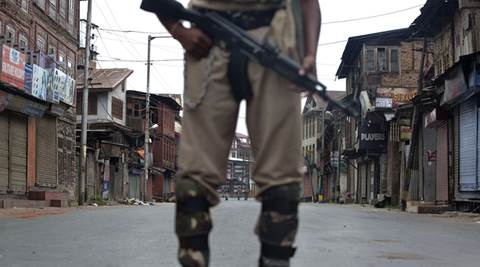Opinion Living in denial
The PDP-BJP government’s diktat to newspapers in the Valley to suspend publishing is a worse than poor decision. The Jammu and Kashmir police conveyed the order verbally as they raided newspaper offices early on Saturday, stopped printing presses and seized copies of the day’s editions. The gag order is to remain in place until July […]

The PDP-BJP government’s diktat to newspapers in the Valley to suspend publishing is a worse than poor decision. The Jammu and Kashmir police conveyed the order verbally as they raided newspaper offices early on Saturday, stopped printing presses and seized copies of the day’s editions. The gag order is to remain in place until July 19, when it will be reviewed. Cable television networks were also suspended but restored after a few hours. The “temporary” ban is a violation of the freedom of speech and expression as set out in Article 19 of the Constitution and that is the democratic right of every citizen of India. The order does not extend to newspapers in Jammu. While flouting a fundamental right, the order is also a spectacular own goal. By denying, albeit temporarily, a right available to other citizens of the country, the government is reinforcing the view of the Valley’s separateness and the feeling of alienation from the rest of the country that its inhabitants nurse.
In the Valley, as in some other parts of the country, the government has experimented time and again with disconnecting mobile internet services, and occasionally, even broadband. Though this is not the first time that newspapers have been banned in the Valley, it still surprises that a democratically elected government in this day and age believes that putting a lid on information and independent or opposing views in the media will help solve its problems. This is a grave mistake; even authoritarian regimes have long given up this method. In place of information and views that can be traced to real and verifiable persons, rumour and speculation will thrive.
Naeem Akhtar, a senior minister in the government, blamed newspapers for “certain projections” that “result in multiplication of tragedies”. This seems to imply that the government’s handling of the situation could not have been better, but it is the newspapers which have failed to reflect this. This is a classic case of shooting the messenger and shows up the bankruptcy of ideas both in the state government and at the Centre on how to deal with the explosive anger on the streets of Kashmir that has refused to go away eight days after the killing of Hizbul Mujahideen militant Burhan Wani by security forces in an encounter. It is not the media that manufactured the anger. While Pakistan has no doubt played a big role in fanning the flames of this anger, it built up over years because of the failures of successive governments in addressing it. Being in denial over this, and blaming the media instead, is not going to make it go away.





